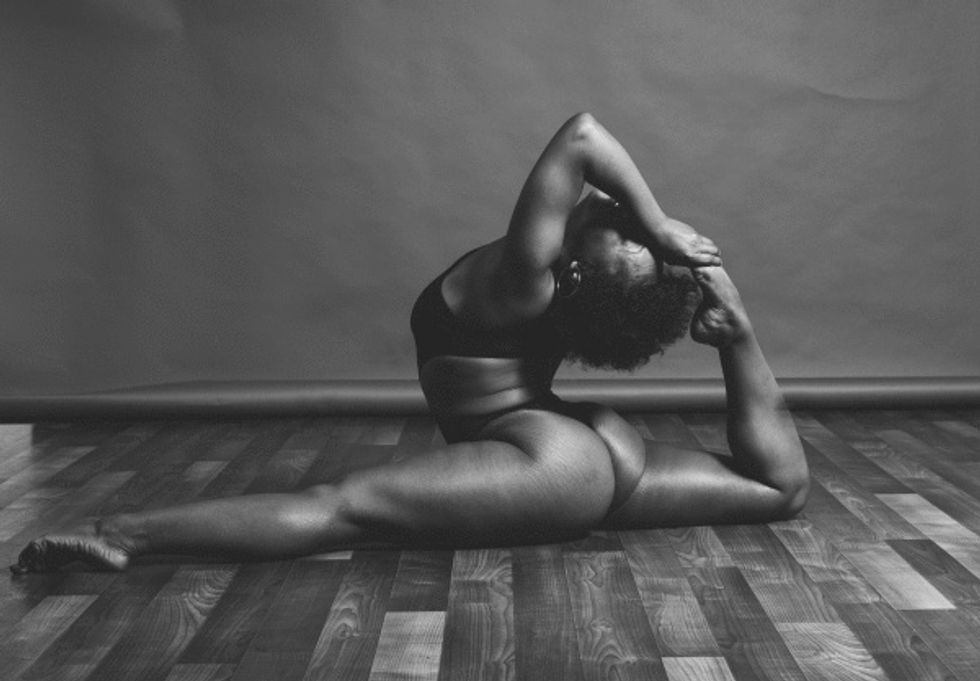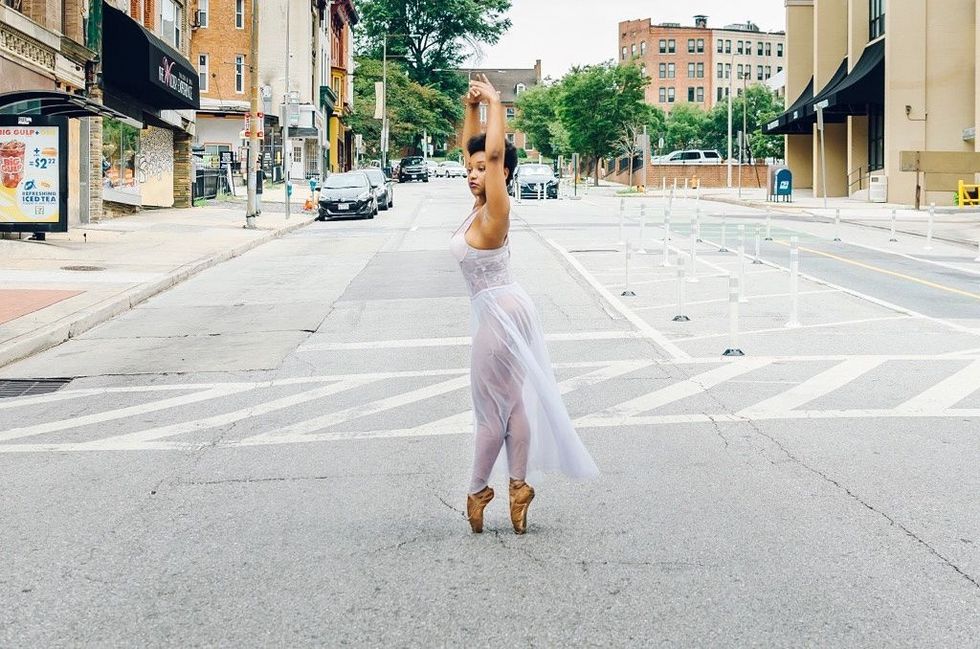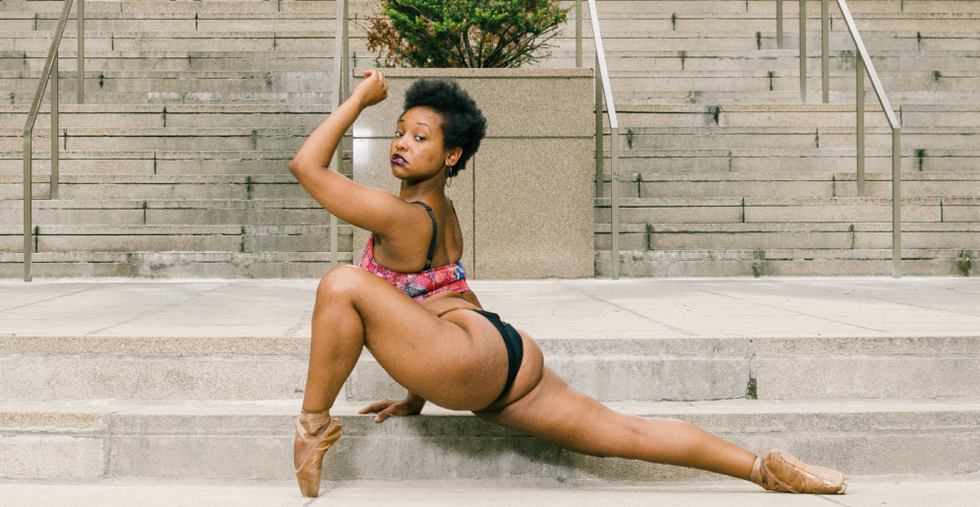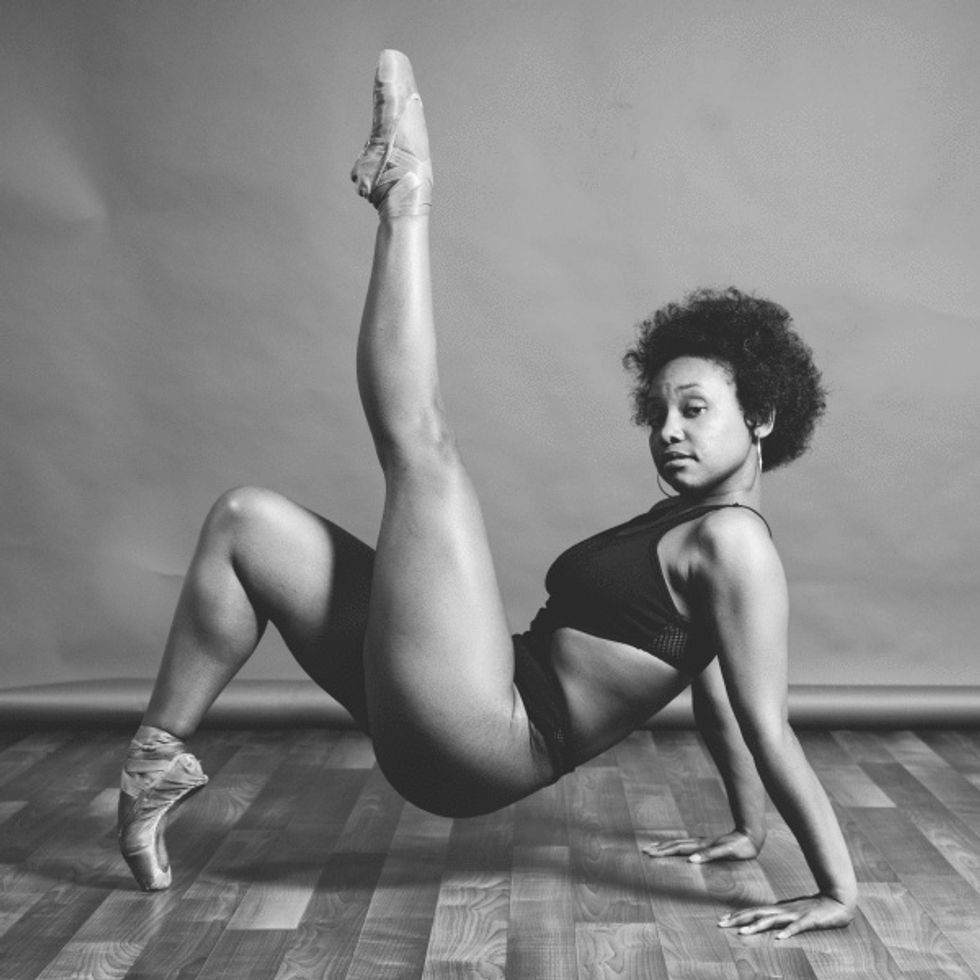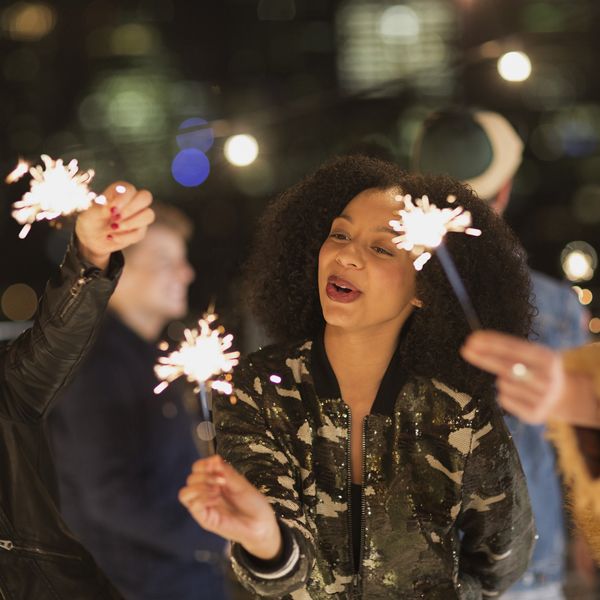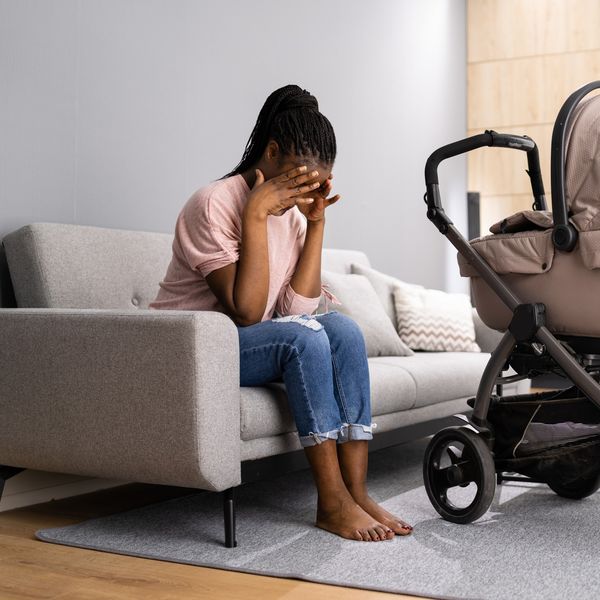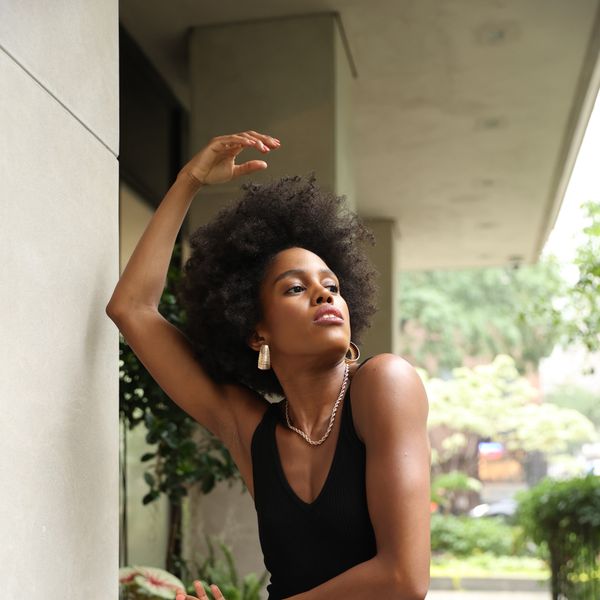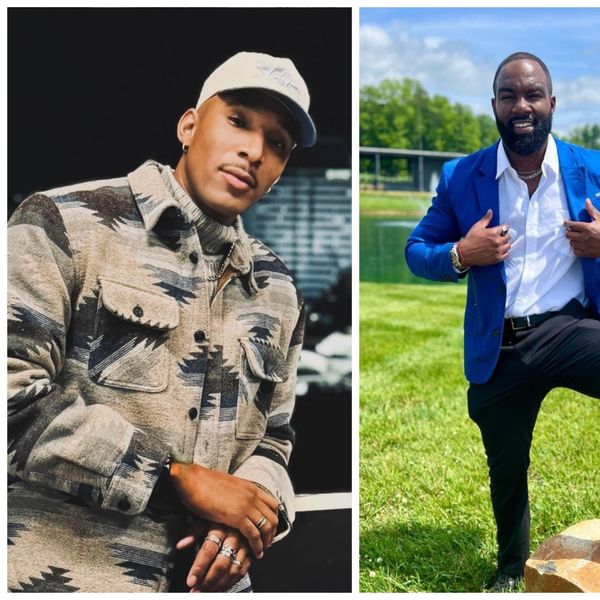
It can be extremely difficult to rebound after a traumatic experience, and Tyde-Courtney Edwards knows more than a thing or two about that struggle. Tyde-Courtney's life changed drastically when, in 2012, she was sexually assaulted near her Baltimore, Maryland apartment.
She was beaten, robbed, spit, and urinated on during the horrific crime---one she detailed for Shape readers last year---and the incident couldn't have happened at a worst time. When the rape happened, Tyde-Courtney, a professional dancer, was prepping for a big audition, a new beginning in a new apartment, and the completion of studies to earn a degree in pedagogy. The incident derailed her plans, crippled her confidence, and ushered her into a life eclipsed in fear and shame. To add to the trauma, Tyde-Courtney found out she was pregnant and went through an abortion alone.
"A lot of things that we don't learn as trauma victims, following any type of physical attack is how to go about reclaiming the vibe again," she told xoNecole in an exclusive interview. "When you are with hospitals or when you have done all your pre-approved sessions with your counselor, you're kind of just left in this odd limbo. And nobody gives you any information about where you could go after that."
"It's very much like a treat 'em and street 'em situation. 'Well, we did what we were supposed to do. You came to your 12 sessions. I gave you all of your pills.'"
Tyde-Courtney, whose attacker was never brought to justice, found herself in a place of depression and self-destruction not knowing how exactly to move forward. "It was just…there wasn't anywhere for me to go and I was devastated. I was fucking myself up. I was just creating these situations where I would allow myself to fall into trouble or to get into more pain and to be as self-destructive as I could," she recalls.
"I just got tired of feeling sorry. I just got tired of being scared. I was tired of whining to people about how I was feeling or whining to people about not being able to convey your feelings, because that's another thing that we deal with. When we have been traumatized, there's all of these feelings, all of these emotions we have that we cannot vocalize."
Tyde-Courtney made a life-changing, brave choice to take her healing into her own hands and turn to what had brought her joy for so many years. She also decided to be the change she wanted to see, to fill a void that she felt other black women could also be struggling with but could find no recourse. From her trauma and her healing, Ballet After Dark was born.
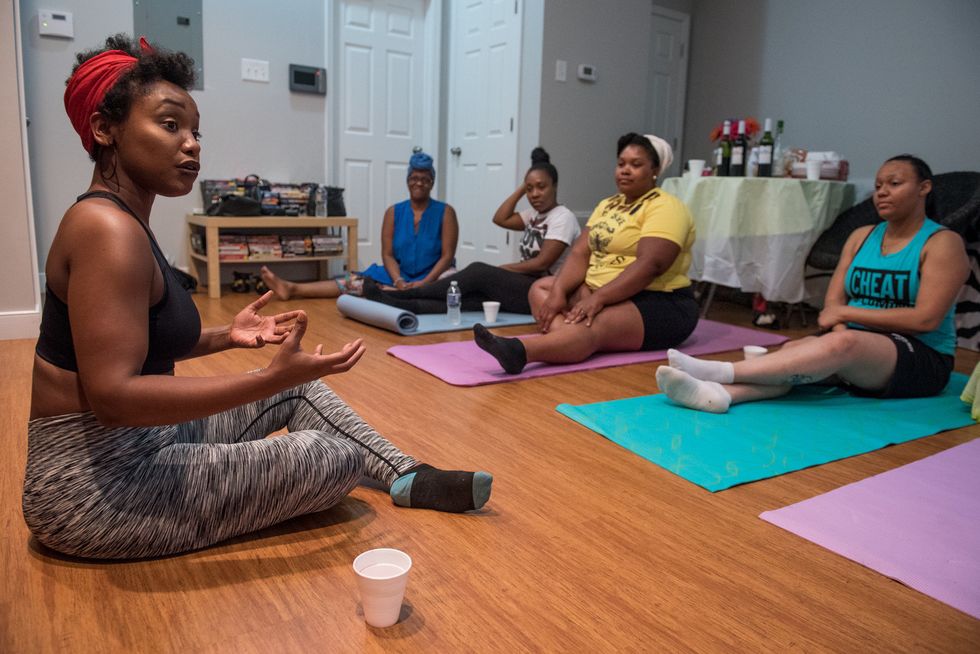
"The program was going, mainly out of necessity. I was struggling trying to find somewhere for me to heal various aspects of myself. And there wasn't a space---a safe space---for women of color to be able to work through their trauma without us feeling marginalized or judged or looked down on in any type of way," she said. "And a lot of these spaces that have been created--- these recreational spaces---are for a particular type of individual. When I would try to be a part of things so that I could heal, or even when I would do the research just so I could be a part of things---just so I could get my shit together---nothing was welcoming of me. There was not a program that allowed for me to deal with, not only the issues that come with domestic and sexual trauma, but also the issues that come with being a black woman…and just being an oversexualized black woman---just trying to be a woman who wants something for herself."
Based in Baltimore, Ballet After Dark offers concierge, ballet-based fitness services, athletic conditioning programs, dance classes, and self-care workshops to survivors of sexual and domestic assault. In carrying out its mission, Tyde-Courtney seeks to be a resource of healing for women who have gone through what she went through, strengthening mind, body, and spirit.
"[Instead of] paying a counselor to talk about all of my issues, all of disappointments, all of my aspirations, everything that I wanted to get accomplished, and there was no place to create my sister circle following the trauma. Going through my trauma and trying to figure out ways to reconnect with myself, led me back into dance."
Even while building the program, she knew she had to let her voice be heard to get past the shame of the experience. Shifting focus to her physical and mental health and to service through dance was a saving grace for Tyde-Courtney. "[I thought], 'Why am I supposed to be quiet about anything? Why am I supposed to be ashamed of anything? Why can't I be confident?' I work for my shit. I'm still working through my shit. I'm still getting through my shit. Why can I not be proud of the fact that I have come from A to D? I'm not at Z. I may not ever get to Z, but I'm here now, so why can I not stand on a mountain and shout that shit out? Why can I not be proud of the fact that after being assaulted and following that with an abortion, that I'm actually able to have healthy sex?"
"There is no room for you to be a survivor of sexual assault and to be bi-positive or to be sex positive…or just to be positive in general."
"You should be living under a fucking rock, so I'm just over that... I've really had the chance of just letting people have it. I'm also sending out a bunch of 'fuck you's' because I'm tired. You know. And I'm in this fight; I'm in this fight for the rest of my life, but I'm not going to deal with no bullshit."
Also, facing aspects of her sexual freedom and health as a woman was important--and she keeps it super-real about that in a way that is self-aware and empowering.
"I've always had a very, very comfortable relationship with sex, even before everything happened. I've always been comfortable talking about it, I've always been comfortable laughing about it. I was always that girl that had 100 boyfriends, just because we were always be sitting around talking about sex… I don't want to be stifled by anything. I have allowed myself to grow into this woman who is 100% transparent. I'm not hiding anything."
Accomplishing full renewal of self after trauma is a journey, and there's no sprint to the finish line for many women working toward it. Tyde-Courtney is very aware that it takes perspective, patience, and perseverance to take things one day at a time. She also recognizes that not every sexual assault survivor's journey to normalcy would feel, sound, or look the same. She began to readily accept and embrace positive truths about herself and what she offered the world.
"I'm a hard worker. I'm a lover. I am a nurturer by nature. I am the mother of a movement right now. But beside all of that, I am a strong, black woman; that's who I am. That's exactly who I am. If nobody knew anything about me and they didn't know my name and they didn't know my story; if they didn't know my education level, they didn't know my level of talent and technique, what they would be able to take away from me is the fact that I exude strength," she said.
"As a survivor, I will have my moments of depression. I will have my moments of just blank voids, when everyone needs to leave me the fuck alone, but I'm not going to deny myself of certain feelings. And I'm not going to tell myself that I should be a certain way. I'm also going to be enough of a sound mind to know that in order for me to have the things that I want, in order for me to have a healthy relationship, in order for me to get to a point where I'm considering a family, I had to work on myself. And I still have to. I had to understand that I may be working on myself for the rest of my life. I had to be okay with that."
"Healing is not linear; there's no perfect way for it to be done."
Tyde-Courtney continues to push forward with Ballet After Dark and is working on a documentary and a workshop tour to expand her advocacy of self-care, fitness, self-confidence, and empowerment to survivors across the country.
"I think the best thing I've discovered about myself is how strong [and] how resilient I actually am. Nothing can break me! It really can't. I think that is what's most pleasing to me, that at the end of the day, with everything that I'm doing and with everything I'm trying to accomplish, I'm ready to keep doing it. I just want to change some lives. That's all I want to do. And they better take advantage of me now, because I might want a baby in a couple of years! They better use me up!"
*Interview has been edited and condensed for clarity
Follow Tyde-Courtney Edwards and her journey with Ballet After Dark on Instagram.
- Ballet After Dark: A Story of Resilience After Sexual Trauma | BLAVITY ›
- Ballet After Dark (@balletafterdark) • Instagram photos and videos ›
- Dancer Who Had an Abortion After Being Brutally Raped Shares ... ›
- Ballet After Dark uses dance, meditation to heal emotional scars ... ›
- Tyde-Courtney Edwards | الملف الشخصي ›
- We're Healing at Ballet After Dark ›
- See How This Ballerina Rape Survivor Is Helping Other Victims ... ›
- Ballet Helped Me Reconnect With My Body After Being Raped, Now ... ›
- Tyde-Courtney Edwards | Facebook ›
This Is How To Keep 'Holiday Season Stress' From Infecting Your Relationship
Hmph. Maybe it’s just me, but it seems like there is something really weird happening in the fall season air (because winter doesn’t officially begin until December 21) that cuddle season is in full swing while break-up season is as well. In fact, did you know that break-ups are so popular during the holiday season that December 11 is deemed Break-Up Day?
The reasons why relationships shift around this time vary; however, I did both roll my eyes and chuckle when I read that a very popular one is because it’s an easy way to get out of getting one’s significant other a Christmas present. SMDH.
Anyway, I personally think that the less shallow folks out here may contemplate calling things “quits” or they at least distance themselves a bit from their partner (and what I’m referring to is serious relationships) due to all of the stress and strain that oftentimes comes with the holidays whether it be financial, familial, due to their tight schedules or something else.
Listen, I would hate for you and your man to miss the fun and happiness of experiencing this time of year, all because you are so overwhelmed or irritated that you can’t really enjoy it. That’s why I have a few practical tips for how to avoid allowing the typical holiday season stress from INFECTING your relationship.
Manage Your Expectations
 Giphy
GiphyUnmanaged expectations. If there is a main reason why the holiday season tends to be so stress-filled for so many people, I’d bet good money that this is the cause. And when you’re in a long-term relationship, expectations can manifest themselves in all sorts of cryptic and/or unexpected ways. You might have relatives who assume that you are going to be with them for Thanksgiving or Christmas when you have other plans in mind. You might be thinking that you are going to spend one amount for presents while your man is thinking something totally different. When it comes to scheduling, your signals may be crossed.
And you know what? To all of these scenarios, this is where clear and consistent communication come in. Don’t assume anything. Don’t dictate anything either. From now until New Year’s, mutually decide to check in once a week, just to make sure that you are both on the same page as it relates to the holidays and what you both are thinking will come along with it. The less blindsided you both feel, the less stressed out you will be. Trust me on this.
Set (and Keep) a Budget
 Giphy
GiphyOkay, so I read that last year, 36 percent of Americans incurred some type of holiday-related debt. Hmph. Last year, there was still some sense of normalcy in this country, chile, so I can only imagine what finances are gonna look like over the next several weeks. That said, since I don’t know a lot of people who don’t find being broke stressful, make sure that you and your bae set a budget and then stick to it this year — no ifs, ands or buts.
Because really, y’all — it doesn’t make sense to deplete savings and/or max out credit cards for a few days of giggles only to be damn near losing your mind because you don’t know how to make ends meet come Dr. Martin Luther King, Jr. Day.
And by the way, this tip doesn’t just speak to things like food and gifts; I also mean travel. If it doesn’t make a ton of sense (or cents) to be all over the place this year — DON’T BE.
Keep Matthew 5:37 at the Forefront
 Giphy
GiphyIf off the top of your head, you don’t know what Matthew 5:37 says, no worries, here ya go: “But let your ‘Yes’ be ‘Yes,’ and your ‘No,’ ‘No.’ For whatever is more than these is from the evil one.” That verse right there? Oh, it’s a boundaries lifesaver! I say that because do you see “maybe” or “I’ll think about it” in there? Nope. LOL. It says that you should tell people “yes” or “no” and leave it at that — and that complements Anne Lamott’s quote, “’No’ is a complete sentence” impeccably well. Yeah, you’ve got to remember that anything beyond a yes or no to a request is privileged information; you don’t owe anyone details or an explanation.
Besides, if you are really honest with yourself, when someone asks you something and you give a “Umm, let me think about it” kind of reply, more times than not, you already know what your answer is going to be — so why not let you both off of the hook? Give your response. Commit to that. And let everyone (including yourself) get on with their lives and schedules.
I promise you that when it comes to those holiday parties, you are pissing more folks off by not RSVP’ing or doing so and not showing up than just saying, “Thank you but not this year” off the rip.
Remember That Your Personal Space Is Privilege Not a Right
 Giphy
GiphyA friend of mine recently bought a new house and invited me over to come see it. He’s a single man with no children, so as I was taking in all of the space that he had, especially as I walked through his finished basement, I joked about relatives coming to live with him. “Hell no” and “absolutely not” were pretty much his immediate responses as he went on to say that some folks even had the nerve to be offended when he told them that he had no intentions on taking DNA in.
Ain’t it wild how people think that your stuff is their right? And yes, that brings me to my next point. Your home is your sanctuary space. If you want to host folks this year — cool. If not, ALSO COOL. Please don’t let folks (family included) guilt you into how they want you to act or even into what they would do if the shoe was on the other foot. You are not them — and as one of my favorite quotes states, “If two people were exactly alike, one of them would be unnecessary.” (A man by the name Larry Dixon said that.)
Hell, my friends? They know that I am good for sending them random things that they need or even want all throughout the year. Coming over to hang out at my pace, though. Uh-uh. Chalk it up to being a card-carrying member of the ambivert club yet I like keeping my living space personal — and I sleep like a baby, each and every night, for feeling that way.
Always remember that your space, your time, your resources, your energy and shoot, yourself period (including your relationship), are all things that are your own. You get to choose how, when and why you want to share them. The holiday season is certainly no exception.
Cultivate Some “You Two Only” Traditions
 Giphy
GiphyIt’s not uncommon for some couples to hit me up after the holiday season to “detox.” Sometimes it’s due to the financial drama (and sometimes trauma) that they experienced. Sometimes it’s because they allowed their relatives (especially in-laws) to get more into their personal business than they should’ve. More than anything, though, it tends to be because they didn’t get enough quality time together and so ended up feeling “disconnected.”
Please don’t let that happen. Listen, I’m not even a holidays kind of woman and yet, I will absolutely sit myself down with some hot chocolate and chocolate chip cookies to enjoy a Hallmark holiday film or two. Aside from the fact that most of them are lighthearted and sweet, I also like that they usually focus on couples loving on each other amidst all of the holiday beauty and ambiance — which is something that all couples should set aside some time to do.
Maybe it’s a vacation. Maybe it’s a staycation. Or maybe it’s my personal favorite, A SEXCATION. Whether it’s for a few days, the weekend or even overnight — don’t you let the holidays go by without setting aside time for you and your man to celebrate one another. Don’t you dare (check out “Are You Ready To Have Some Very Merry 'Christmas Sex'?”).
GET. SOME. REST.
 Giphy
GiphyI once read that 8 out of 10 people get stressed out over the holidays and 3 out of 10 lose sleep during to it — and when you’re stress-filled and sleep-deprived, that can absolutely lead to hypersensitivity, making mountains out of molehills and even not being in the mood for sex.
Your relationship can’t afford to go through any of this, so definitely make sure to prioritize rest. I don’t care how unrealistic it might seem during this time, sleep should never be seen as a luxury; it will always and forever be a great necessity.
That said, try to get no less than six hours of shut-eye in (check out “6 Fascinating Ways Sex And Sleep Definitely Go Hand In Hand”) and even ask your bae to take a nap with you sometimes (check out “Wanna Have Some Next-Level Sex? Take A Nap, Sis.”). Not only will sleep help to restore your mind, body and spirit but, when it’s with your partner, it’s an act of intimacy that can make you both feel super connected, even in the midst of what might feel like chaos.
___
Holiday season stress is real. Still, never give it the permission or power to throw your relationship off. Put you and your man first and let the holidays be what they are gonna be, chile.
Let’s make things inbox official! Sign up for the xoNecole newsletter for love, wellness, career, and exclusive content delivered straight to your inbox.
Featured image by Shutterstock
'Constant Reassurance' Is The Relational Orange Flag No One Wants To Address
Read more than scroll. Boy, if there is a motto that I would encourage people to implement, now more than ever in their life, it would be how important it is to read (actual books, researched data and fact-based information) over merely scrolling via social media. Because boy — every time I look out on apps to see what folks are talking about, I don’t know if I’m impressed with or appalled by how many nothing-more-than-emotionalized opinions are so boldly stated when, after five minutes on Google, it’s clear that there are virtually zero facts to back them up.
Not to mention the fact that so many folks literally don’t read (you know, past skimming) anymore — and yes, I have stats to prove it. I recently read that back in 2022, reportedly, a little over 48 percent of people read one book over the course of that entire year (that is not a good thing and proves that book reading is on a steady decline). Meanwhile, the amount of time that is spent on social media: 2.5 hours on a daily basis. That’s 150 minutes of listening to folks just say…whatever. And if you listen to it long enough, you could actually start believing it as gospel.
This includes what I am going to touch on today: the belief that if someone really cares about you, they should constantly reassure you. Y’all damn near are gonna have me join the world of social media again, just to address this one fallacy. For now, though, I’ll settle for making some points via this article — because as you can see from the title, I don’t agree with that conclusion at all.
In fact, I personally believe that thinking this way is a pretty big relational orange — if not red — flag.
Reassurance. And What It Does for a Child.
 Giphy
GiphyIf you’ve read enough of my content, you know that I am big on word definitions — and when it comes to the word “reassurance,” the meaning alone explains why this article has the title that it does:
Reassurance: something, such as information, praise, or an action or gesture, that soothes, comforts, or restores to confidence
Reassurance restores confidence. Bookmark that, please. I will certainly circle back to that point before I am done.
Okay, so when it comes to, say a child, there is absolutely a place for reassurance. That’s because they are still in the process of significant self-development and so they need reassurance in order to feel safe, secure and loved. It’s also a way for them to establish trust in others.
However, did you know that many mental health experts say that if a child deals with, say anxiety, constant reassurance can actually be counterproductive because they can start to rely on external validation to emotionally stabilize them instead of learning how to remain calm and relaxed on their own (yeah, bookmark that too)? Some other ways that constant reassurance can become potentially problematic is it can cause kids to create problems that don’t exist, to overthink and to jump to the wrong conclusions (hmm…very interesting).
And so, already, we’re seeing something pretty interesting, right? Although reassurance has its place, too much of it, even for kids, typically ends up doing more harm than good.
Let’s keep building.
How 'Lack' As a Child Can Manifest As an Adult
 Giphy
GiphyOkay, so we just touched on how constant reassurance can be counterproductive for an anxious child. Now what about when that child grows up? If they never learned how to properly and effectively deal with their anxiety, what then? Well, this is where attachment styles can very easily come into play — especially since one of them is literally called “anxious attachment style.”
Anxious attachment style is rooted in insecurity. It typically stems from experiencing the type of dysfunctional upbringing that resulted in one or both parents being unpredictable or inconsistent in their caregiving approach and techniques. As a result, the child deals with things like fear of abandonment or rejection and, without healing from that, they become an adult who is pretty much the exact same way.
In relationships, it can manifest in them being extra clingy, codependent, super jealous, controlling or — catch it — someone who is always looking for validation and reassurance.
Hmph. Did you catch that? Did you really catch that? Needing constant reassurance in a relationship IS NOT something that should automatically come with a relationship. In fact, if you’re someone who has this type of need or even expectation, there’s a really good chance that what you actually need is therapy — not for your partner to work harder to make you feel better about yourself or the relationship.
Which brings me to my next point.
Relationships Can Be Therapeutic. They Aren’t Therapy, Though.
 Giphy
GiphySomething that some of my clients will tell you that they’ve heard me say, more than once I might add is, “PARENT and PARTNER are not palindromes.” A palindrome is a word (line, sentence, etc.) that is the same whether it is spelled backwards or forwards — and while, of course, parent and partner couldn’t qualify as being that, what I mean is there are far too many people who think that partners should pick up where parents left off and/or dropped the ball — and that is a super unhealthy approach to relationships. Come to think of it, not only is it unhealthy but really unfair as well.
This is exactly why I’m not big on phrases like “the princess treatment” in adult relationships. A princess is the daughter of a king while a queen is the wife of one. For a grown woman to expect a man to do what a father did for her as a child without accepting that as an adult, there are far more responsibilities as a wife that comes into play? Yep, that is toxic thinking.
And you know what? So is expecting your partner to overcompensate for where your father and/or mother didn’t show up in the way that they should have. That is not your partner’s fault, their role or their assignment while dating you. If you feel otherwise, it really is time to speak with a professional who can help you to do a bit of “reprogramming” in your thinking because, for you to feel and/or assume that since your parents didn’t make you feel confident and secure or teach you how to value yourself, your partner should work overtime to make up for it? There is not one thing that is healthy, mature or emotionally solid about having that type of mindset.
And that is why I am also good for saying that, although relationships can be therapeutic (healing), they should never EVER be seen as therapy. Therapists are trained to deal with the mental and emotional challenges that people have. On the other hand, no one should expect their partner to have the knowledge and expertise that professionals do — and while we’re here, partners also shouldn’t trust that someone who needs the assistance of a therapist to become whole (again) would know exactly what steps are required for that to happen.
So yeah, if you’re someone who thinks that being loved means that someone needs to constantly make you feel good about yourself or secure in the relationship — you probably do have an anxious attachment style. See a professional to get that confirmed, though. Because no one should have to make you feel valued or worthy. That is an inside job.
And this brings me to my final point.
It’s Not Fair to Want Someone to Love You More than You Do
 Giphy
GiphyFor this last point, something that Christ once said immediately comes to mind:
“No one puts a piece of unshrunk cloth on an old garment; for the patch pulls away from the garment, and the tear is made worse. Nor do they put new wine into old wineskins, or else the wineskins break, the wine is spilled, and the wineskins are ruined. But they put new wine into new wineskins, and both are preserved.” (Matthew 9:16-18 — NKJV)
A lot of times, Christ spoke in parables because it was easier for people to get where he was coming from (Matthew 13:13). Anyway, along these lines, what would be the point in pouring a liquid into a bottle that has a hole in it? It’s not built to contain and maintain the fluid and so, no matter how delicious the drink may be, no matter how many times it’s poured into the bottle, the bottle is never going to remain full — because it has cracks in it.
BOOKMARK THAT.
My fourth baby’s daddy (check out “Why I Named The Children I Aborted”), while we were in the process of our “exit interview” (which is what I choose to call it) of our dynamic, he said something that has always stayed with me: “Shellie, your biggest problem is you receive compliments are revelations when they should be seen as confirmations.” Hmph. The irony of HIM saying that is kind of a trip and yet, at the time when we were experiencing each other, he was exactly right. I should’ve never had such a low sense of self-worth that whatever a man said to me had me so in awe that I either felt extremely grateful or became super addicted to his validation.
And y’all, that is exactly what needing constant reassurance looks like — because why does someone need to keep telling you that you are beautiful, keep saying that you are wonderful, keep letting you know that they want to be with you — keep restoring your confidence in yourself and in your relationship with them?
In other words, why should they work harder at making you feel good about yourself and solid in your relationship than you are willing to? Isn’t that just like pouring liquid into a broken bottle?
There is someone in my family tree who I had to distance myself from because he kept venting to me about his marriage and the fact that his wife was just like this. Sadly, it was never (and I do mean NEVER) enough that he chose her — whenever she felt some type of way about herself, here she came looking for him to fill her voids. After a couple of years of the nonstop needs for reassurance, he was worn out from doing it and I was exhausted from hearing about it. He was too scared to call her out and she was too unaccountable to get the real help that she needed. Whew. Toxic on top of toxic.
So Shellie, what are you saying — that we shouldn’t expect compliments, affirmations, support and encouragement in our relationships? Chile, if that is what you got out of this, you are choosing to think that way because that couldn’t be further from where I am coming from.
Again, you’ve got to remember what reassurance means: it’s about restoring confidence. A compliment is “an expression of praise, commendation, or admiration” yet if you already know that you are pretty, smart, funny, whatever, someone telling you that isn’t “building your confidence;” it’s cosigning on something that you are already aware of. Encouragement is about inspiring or stimulating someone and so yes, of course, the right partner is going to want to see you win in life and so they are going to offer up influence and motivation to help you — but what if they aren’t there?
Shouldn’t you be able to encourage yourself? ABSOLUTELY. However, expecting them to restore your confidence due to things that have nothing to do with them or because you simply lack self-confidence? That is not how relationships are to go. If you aren’t sure of yourself (which is a foundational definition of confident), get to the root of why and then figure what you need to do to become sure — that way, your partner doesn’t have to constantly “fill you up;” actually, what they do will be surplus instead of void-filling because your “bottle” will be unbroken.
____
I’m telling you, if you pay attention to the relationship side of socials, at least twice a day, someone will talk about how they think that a relationship should entail receiving constant reassurance. Lies on top of lies. No one should think that love means trying to make someone else feel sure about themselves because they don’t know how to do so on their own.
And this is why I say that expecting constant reassurance is an orange, if not red, flag.
Because when you already feel good about yourself, there is no need.
And if you don’t, figuring out how to is an inside job — FIRST.
Let’s make things inbox official! Sign up for the xoNecole newsletter for love, wellness, career, and exclusive content delivered straight to your inbox.
Featured image by Shutterstock



